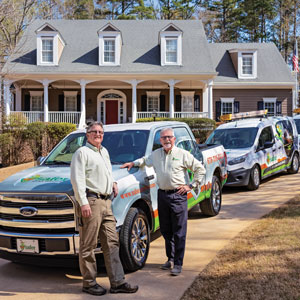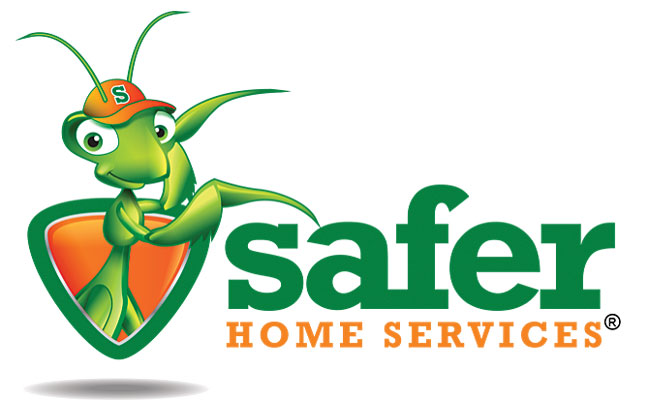
Safer Homes Services franchisee Bob Benbow, left, stands with company co-founder Jim Swayne at Benbow’s Tyrone, Ga., office. Safer Home Services is now a BELFOR Franchise Group brand. Photo: Studio Jaki Photography
“When I founded the business in 2014, it was me and the dog,” quips Jim Swayne. Sage the Hound Dog may have been new to pest control, but Swayne was not: Before founding Safer Home Services — with human partners Chuck Steinmetz, a Pest Management Professional Hall of Famer (Class of 2017) and Dr. Phil Nichols — Swayne had been in the business since 1985. He had met Steinmetz and Dr. Nichols when he joined Orlando, Fla.-based Middleton Pest, where the duo had introduced the industry to the concept of “Once-A-Year Pest Protection” three years before. The three took their talents to Sears Pest Control in the early 1990s, and while their careers diverged after that, they reunited with Safer Home Services.
Dr. Nichols and Steinmetz were semi-retired from the start, so Swayne kept the business humming. The company grew to $3.8 million by 2022, a 26 percent leap in revenue just within the last five years. Locations not only include his main office in Clearwater, Fla., and two branches, but also a franchise in Tyrone, Ga., run by longtime colleague Bob Benbow.
“By 2016, we had good traction in the Florida market,” Swayne recalls. “We were growing with customers and geography, but I wanted to keep the routes tight. Added windshield time doesn’t help anyone.
“That’s when I realized, if we franchised, we could bring talent and capital to areas we would not get to otherwise,” he adds.
Swayne and Benbow struck a deal to convert Benbow’s company to the Swayne brand and once-a-year pest protection concept in 2017, and are still going strong today.
“There are so many advantages to being part of a franchise group,” Benbow reports. “You immediately become part of a company with a recognizable and trusted brand, which helps with marketing, advertising and reputation management. You gain access to tons of resources and support in areas such as technical, human resources, and business management. Plus, being part of an organization with established systems and processes even makes your business more valuable when it’s time to transition.”
A time of change

Sage the Hound Dog is considered a company
“co-founder” and mascot. The 65-pound rescue canine has a dog bed in every office at Safer Home Services’ headquarters and has yet to miss a day of work. PHOTO: SAFER HOME SERVICES
Like many established firms, by 2021, Swayne was receiving purchase offers regularly. “But all of them wanted to take the Safer Home Services brand and tuck it into their brands,” he admits. “I believe too much in the power of our brand, in once-a-year pest control, to let it go.”
Swayne wanted to expand his franchise concept but concluded it would be easier with help: “I sent letters to the Top 12 home services brand owners, and said ‘Look, I have experience, I built a great company I started franchising and I am now looking for a partner.’”
Enter BELFOR Franchise Group.
“BELFOR liked our story and originally said, ‘Can we get a conference call with the president tomorrow? Better yet, can we visit you Friday?’ They planned for a three-hour visit, but stayed all day,” Swayne recalls.
A few weeks later, the BELFOR team returned with founder Sheldon Yellen, who Swayne says “loved what he saw and began negotiating the deal.”
Swayne, who has stayed on as president of the Clearwater office and is actively recruiting franchisees, says he believes it was the absolute right move for his employees and customers.
‘No downside’
“Every business transitions at some point, whether it’s going out of business, turning it over to the kids, or selling to someone else,” he points out. “Personally, I had a 10-year plan. I wanted to build a strong team for a leveraged management buyout.”
With the support of BELFOR, his team now has unlimited opportunity in their careers, Swayne says. “Everyone on the team is licensed, and can become a trainer, a manager — we plan to grow from four to 100-plus locations by 2028. The brand remained intact, and everyone’s compensation and benefits increased. To me, there was no downside to the acquisition.”
BELFOR offers other advantages, too. “With their support network, a franchise has more value than the same-sized business that isn’t a franchise.
As a potential buyer, you need to look at revenue, profit, cash flow, and systems and procedures.
A franchise already has all of that in place,” he says.
Another benefit is the 12 sibling brands Safer Home Services gained. Employees get discounts on everything from plumbing to cabinet refinishing. Patch Boys, a BELFOR brand, specializes in drywall repair.
“At least four times a year, we have a tech who steps through a ceiling,” Swayne says with a laugh. “Now we have easy access to a quality business that will take care of making it right for our customers. There’s a lot of cross-pollination among our brands.”
Another benefit is the ability to pick the brains of other successful franchise owners. “We meet once a year at a national convention, and the network and ideas shared are just amazing,” Swayne reports.

Founded: 2014
Began franchising: 2017
Corporate-owned locations: 3
Franchised locations: 1
Benbow agrees. “Having the ‘intangible’ support as well as the tangible support is a huge benefit,” he adds. “You know you’re part of a family of companies that share the same challenges as you, and you’re never alone.”
Swayne says he loves pest control because it matches his desire to help others. “My parents and grandparents always told me to find something I’m good at that serves other people,” he says. “When you find it, hold onto it.”
He also loves the challenges and learning that are inherent in running a pest control business.
“One thing that sets our industry apart from other service businesses is all of our adversaries have intelligence,” Swayne points out. “The toilets, the carpeting — these have no intellect. But ants, termites and rodents? They have intelligence. While we spend our time figuring out the best ways to prevent and mitigate pests, the pests are trying to figure out how not to be prevented and mitigated. It’s an ongoing challenge that keeps us in business.”
In professional pest management, the Top 2 ways to grow are by adding new customers or acquiring other companies. But there’s a third way to fast-track company growth: Becoming a franchisee, which gives owners the control and freedom of running their own businesses with the backing of sales, marketing and technical support, as well as volume pricing discounts and employee perks they might not otherwise be able to offer.
As of 2022, there were 792,000 franchise establishments in the United States, with an economic output of roughly $827 billion, employing approximately 8.5 million people. Commercial and residential services rank as No. 4 and No. 5, respectively, after the Top 3 of quick-service restaurants, full-service restaurants and real estate.
According to the International Franchise Association (IFA), despite the whispers of a recession in 2023, the future continues to shine bright:
- 33 percent of franchisors anticipate a sales increase of 1 percent to 5 percent in 2023.
- 30 percent of franchisors anticipate revenue gains of 6 percent to 10 percent in 2023.
- 20 percent anticipate their franchisees’ revenues will increase by 11 percent. A recent article in Forbes points to three franchising trends this year that fit the professional pest management industry almost to a “T.”
- The market is favoring environmentally aware companies. As Forbes puts it, “businesses with purpose are set to flourish” as consumers want to hire firms that care about protecting public health.
- The market is valuing innovation. Consumers want to work with companies that are staying cutting-edge on techniques and products to deliver the best possible services and goods.
- Market disruptors are gaining an edge. Forbes defines market disruption as “breaking through the conventional industry positioning and showcasing how your brand is doing things differently.” Companies that have the financial backing to take some risks and make bold moves in marketing, new service offerings, etc., will have the advantage over competitors who simply stay the course.
If the thought of owning a franchise is starting to sound appealing to you, read on for the stories of three franchisees in the professional pest management industry. Each came to their current positions in very different ways, but all are experiencing enormous job satisfaction, as well as happy employees and customers.
References
- Forbes.com/sites/forbesbusinessdevelopmentcouncil/2022/11/15/3-franchise-industry-trends-and-challenges-to-watch-in-2023, accessed March 18, 2023
- Franchising.com/articles/recession_predictions_for_franchising_in_2023.html, accessed March 18, 2023
- Statista.com/topics/5048/franchising-in-the-us, accessed March 18, 2023
Leave A Comment